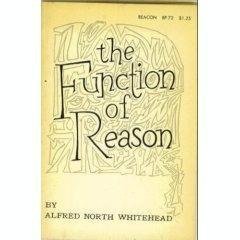What do you think?
Rate this book


Paperback
First published January 1, 1929
In the animal body, we can observe the appetition towards the upward trend, with Reason as the selective agency. P. 24
Science has always suffered from the vice of overstatement. In this way conclusions true within strict limitations have been generalized dogmatically into a fallacious universality. P. 27
Large sections of the clergy were the standing examples of obscurantism. Today their place has been taken by scientists. Today scientific methods are dominant, and scientists are the obscurantists. Pp. 43-44
The proper satisfaction to be derived from speculative thought is elucidation. It is for this reason that fact is supreme over thought. P.80
But mere blind appetition would be the product of chance and could lead nowhere. In our experience, we find Reason and speculative imagination. There is a discrimination of appetitions according to a rule of fitness. This reign of Reason is vacillating, vague, and
dim. But it is there. Pp. 89-90 (End of the book)